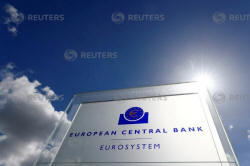ECB keeps policy unchanged, staying on course to curb
stimulus
 Send a link to a friend
Send a link to a friend
 [September 13, 2018]
By Balazs Koranyi and Francesco Canepa [September 13, 2018]
By Balazs Koranyi and Francesco Canepa
FRANKFURT (Reuters) - The European Central
Bank kept policy unchanged as expected on Thursday, staying on track to
end bond purchases this year and raise interest rates next autumn, even
as protectionist moves around the globe drag on growth.
With inflation rebounding and growth leveling off at a relatively
healthy pace, the ECB has been gently removing stimulus for months in
the belief that a range of risks from protectionism to emerging market
turbulence and Brexit will not be enough to derail a growth run now into
its sixth year.
Making only a nuanced tweak to its policy stance, the ECB said it would
halve its monthly bond purchases to 15 billion euros from October,
firming up its previous language, which said only that such a move was
anticipated.
But it maintained its stance that bond buys are expected to end by the
close of the year and that interest rates will stay unchanged at least
through next summer. Some analysts say the unusually long horizon for
that policy guidance will leave the bank on auto pilot for months.

Attention now turns to ECB President Mario Draghi's 1230 GMT news
conference, during which he will detail new growth and inflation
projections and face questions about growing risks to the outlook. He
may also discuss how the ECB will reinvest cash from debt maturing as
part of its 2.6 trillion euro bond purchase program.
But even as economists are focusing on risks, Draghi is likely to
emphasize that expansion is solid enough to absorb spare capacity and
thus generate inflation, even if it could still take years to push
consumer price growth back to the bank's near 2 percent target.
He is also likely to argue that wage growth is improving, further
supporting the bank's expectation that inflation will slowly but surely
rise towards the target.
The ECB has kept rates in negative territory for years and has bought
more than 2.5 trillion euros of debt, depressing borrowing costs and
driving up economic growth following a double-dip recession that nearly
tore the 19-member currency bloc apart.
While the scheme has appeared to work, inflation is rising more slowly
than earlier hoped and much of the ECB's firepower is exhausted, leaving
it with few tools to fight the next downturn.
[to top of second column] |

The logo of the European Central Bank (ECB) is pictured outside its
headquarters in Frankfurt, Germany, April 26, 2018. REUTERS/Kai
Pfaffenbach/File Photo

OPTIMISM?
Despite Draghi's optimism on growth, the bank is likely to cut some of its
forecasts after a string of weak figures over the summer, according to a Reuters
poll of economists. Even leading indicators suggest that growth will at best
level off rather than rebound after a weak start to the year.
Draghi will also face questions about fiscal prudence in Italy, where a populist
government is contemplating whether to challenge European Union spending rules.
Such a risk from one of the bloc's weakest members has kept bond markets
volatile, raising the risk of persistent turbulence.
New growth forecasts are likely to be only a touch lower than the June
projections, however, and inflation expectations are seen broadly stable,
supported by higher energy costs and slowly building wage pressures.
Draghi may also provide further detail on how the ECB will reinvest funds from
maturing debt, though sources close to the discussion said these decisions will
not have a meaningful impact on policy as they will be mostly technical moves to
ensure a smooth process.
With Thursday's decision, the ECB's deposit rate, currently its primary interest
rate tool, will remain at -0.40 percent while the main refinancing rate, which
determines the cost of credit in the economy, will remain at zero.
(Reporting by Balazs Koranyi and Francesco Canepa; Editing by Catherine Evans)
[© 2018 Thomson Reuters. All rights
reserved.] Copyright 2018 Reuters. All rights reserved. This material may not be published,
broadcast, rewritten or redistributed.
Thompson Reuters is solely responsible for this content.
 |